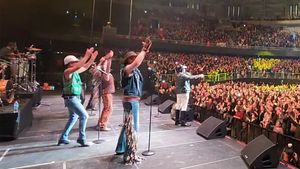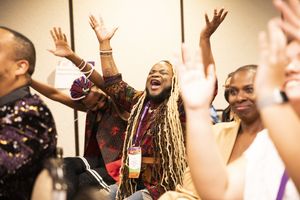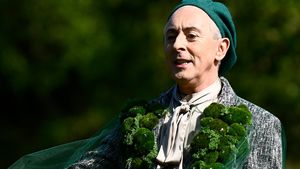There’s a rich and largely unknown story about the contributions from Black and LGBTQ+ Americans to the creation of our country during the colonial era. Those legacies include much of what we now cherish as American cuisine, as gay chef Michael Twitty explains in his award-winning book, The Cooking Gene: A Journey Through African American Culinary History in the Old South.
Twitty describes The Cooking Gene as “a blend of culinary history, personal memoir, and social commentary sprinkled with a few recipes.” He chose this approach for a simple reason. “I wanted my whole being represented,” he told our sister publication The Advocate earlier this year. “I’m an African-American, I’m gay, I’m Jewish, I’m of Southern heritage, I’m a bear, I’m all of these things crossing paths. And I wanted to write a book that responded to that history and those stories in a precise and personal way.”
Twitty traces Southern cooking and his own heritage back through the lives of enslaved Black people (and white plantation owners), back through the Great Passage, back to Mother Africa.
He now helps others do this genealogical work as well, and he says exploring the culinary traditions of one’s historical homeland is different than doing so as a tourist. He says, “The first thing you look for are familiar smells and flavors. The trip to the local open-air market is usually the ice breaker. The street food, the tone of the arguments, the gestures of hospitality and altruism get you ‘back home,’ to a place you’ve spiritually been, but not physically. We get cooking, we haul in fishing nets, we learn how traditional ingredients are made, and we round all of that out with naming ceremonies and other activities that bring us back into the fold.”
While Africans brought many of their traditional recipes with them to America, they became innovators here as well. It’s a history begging to be rediscovered.
Twitty’s advice for reconnecting with our ignored history is to “Explore alternative spaces that honor local cultures and oppressed and marginalized communities. Look around... how are people treated? Which museums tell the truth?”
Twitty is helping to create an alternative space and further truth-telling by collaborating with Colonial Williamsburg to increase awareness of the role of Africans in colonial-era society. He helped establish the Sankofa African Virginian Garden at Colonial Williamsburg to demonstrate what free and enslaved Black gardeners cultivated (for themselves and white settlers).
Twitty says this “tells us more about their humanity. It tells us about their agency and entrepreneurship as well as power and resistance. These were people, not property.”
He continues, “Sankofa is about showing the African presence on the land, especially in a place where 52 percent of the population [of the city of Williamsburg], was Black and just miles from the port where their parents or grandparents came from the continent.”
Earlier this year Twitty celebrated the Sankofa harvest but he says the garden’s real “fruitfulness lies in visitors seeing the plants and having deeper conversations about the enduring impact of these spaces on food, music, culture, and spiritual and medicinal practices.”
Twitty has also performed consultancy work with Colonial Williamsburg, saying “it’s been a wonderful evolving relationship that has widened opportunities to explore early African-American history.”
Just as the living museum has increased its representation of Africans and their contribution to early America, so has Colonial Williamsburg recently dedicated a team to discover the queer history of the pre-1776 period.
The Colonial Williamsburg Foundation formed a Gender and Sexual Diversity Research Committee to uncover the history and personal stories of queer Williamsburg that were often hidden in plain sight.
Ren Tolson of the Colonial Williamsburg Foundation believes the reason people know so little about LGBTQ+ contributions to American history is that few experts ever looked for those contributions. This lack of scholarly interest in early American queer history means many people just assume it never existed, but LGBTQ+ people can be found throughout this nation’s history.
For example, Baron Friedrich Wilhelm August Heinrich Ferdinand von Steuben, the Prussian military expert hired by George Washington to turn an undisciplined and demoralized Continental Army into an effective fighting force, was also an out gay man, according to many scholars.
It’s taken over two centuries for us to learn of Black and queer contributions to American history, but, thanks to the efforts of those like Twitty and the researchers at Colonial Williamsburg, the truth is finally being told.



























































































